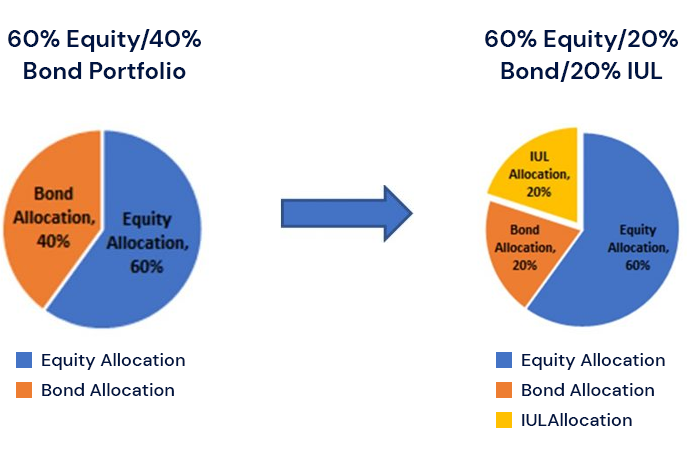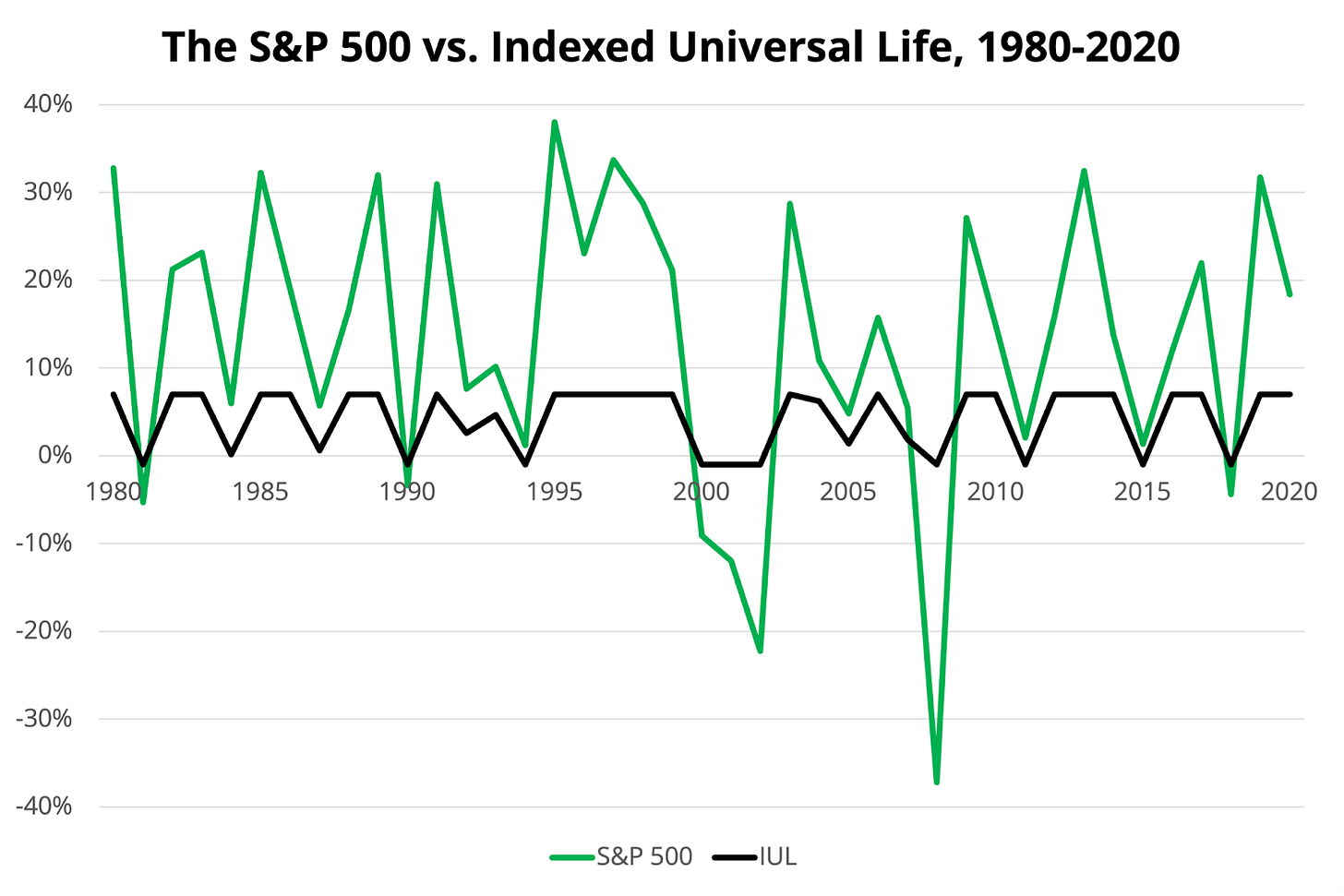All Categories
Featured
Table of Contents
1), often in an effort to defeat their category standards. This is a straw male argument, and one IUL individuals enjoy to make. Do they contrast the IUL to something like the Vanguard Total Amount Stock Market Fund Admiral Show to no tons, an expense proportion (ER) of 5 basis points, a turnover ratio of 4.3%, and an outstanding tax-efficient document of distributions? No, they compare it to some horrible actively handled fund with an 8% lots, a 2% EMERGENCY ROOM, an 80% turn over ratio, and a terrible document of short-term capital gain distributions.
Common funds commonly make yearly taxable distributions to fund proprietors, even when the worth of their fund has actually dropped in value. Common funds not just call for revenue coverage (and the resulting annual taxation) when the mutual fund is going up in value, however can likewise enforce revenue tax obligations in a year when the fund has actually dropped in worth.
That's not exactly how common funds function. You can tax-manage the fund, collecting losses and gains in order to reduce taxed distributions to the financiers, but that isn't somehow going to transform the reported return of the fund. Just Bernie Madoff kinds can do that. IULs avoid myriad tax catches. The ownership of shared funds might call for the mutual fund owner to pay projected taxes.

IULs are simple to place to ensure that, at the owner's fatality, the beneficiary is not subject to either earnings or inheritance tax. The very same tax obligation decrease techniques do not function nearly too with mutual funds. There are many, often costly, tax traps connected with the moment trading of mutual fund shares, traps that do not relate to indexed life Insurance coverage.
Chances aren't extremely high that you're mosting likely to go through the AMT due to your common fund distributions if you aren't without them. The remainder of this one is half-truths at best. While it is true that there is no income tax obligation due to your heirs when they acquire the profits of your IUL plan, it is likewise real that there is no earnings tax due to your heirs when they inherit a common fund in a taxed account from you.
Iul Companies
There are much better ways to prevent estate tax problems than buying investments with reduced returns. Shared funds may cause earnings taxation of Social Safety advantages.

The growth within the IUL is tax-deferred and may be taken as tax complimentary income through loans. The policy proprietor (vs. the common fund supervisor) is in control of his or her reportable income, hence allowing them to decrease or even eliminate the taxation of their Social Security advantages. This set is great.
Below's another marginal problem. It's true if you buy a shared fund for say $10 per share right before the circulation date, and it disperses a $0.50 distribution, you are then going to owe tax obligations (possibly 7-10 cents per share) despite the truth that you haven't yet had any kind of gains.
In the end, it's actually concerning the after-tax return, not how much you pay in tax obligations. You are mosting likely to pay even more in taxes by utilizing a taxed account than if you get life insurance coverage. Yet you're also possibly going to have even more cash after paying those taxes. The record-keeping demands for possessing common funds are substantially much more complicated.
With an IUL, one's documents are kept by the insurer, duplicates of annual declarations are mailed to the proprietor, and distributions (if any kind of) are completed and reported at year end. This set is also type of silly. Certainly you ought to maintain your tax records in case of an audit.
No Lapse Life Insurance
All you have to do is push the paper into your tax folder when it appears in the mail. Barely a factor to get life insurance. It's like this guy has actually never ever purchased a taxed account or something. Common funds are commonly part of a decedent's probated estate.
Furthermore, they are subject to the hold-ups and costs of probate. The proceeds of the IUL plan, on the other hand, is constantly a non-probate distribution that passes beyond probate directly to one's named recipients, and is consequently exempt to one's posthumous financial institutions, undesirable public disclosure, or comparable delays and prices.
We covered this set under # 7, however just to wrap up, if you have a taxable common fund account, you have to place it in a revocable depend on (or even easier, utilize the Transfer on Death classification) in order to avoid probate. Medicaid incompetency and lifetime revenue. An IUL can supply their owners with a stream of income for their entire life time, no matter exactly how lengthy they live.

This is useful when organizing one's events, and converting assets to income before an assisted living facility confinement. Common funds can not be converted in a similar manner, and are practically always considered countable Medicaid possessions. This is one more foolish one promoting that inadequate individuals (you recognize, the ones who require Medicaid, a government program for the poor, to pay for their retirement home) ought to use IUL instead of common funds.
Universal Index Annuity
And life insurance coverage looks terrible when contrasted rather versus a retired life account. Second, people that have money to purchase IUL above and beyond their pension are going to need to be dreadful at managing cash in order to ever receive Medicaid to pay for their assisted living home expenses.
Persistent and incurable ailment biker. All policies will certainly permit a proprietor's very easy accessibility to cash from their plan, typically forgoing any abandonment penalties when such individuals experience a major health problem, require at-home care, or end up being restricted to a retirement home. Common funds do not offer a comparable waiver when contingent deferred sales charges still put on a common fund account whose owner needs to market some shares to money the costs of such a keep.
Index Life Insurance Companies
You obtain to pay more for that benefit (cyclist) with an insurance plan. What a lot! Indexed global life insurance coverage offers survivor benefit to the recipients of the IUL owners, and neither the owner nor the recipient can ever lose cash because of a down market. Common funds provide no such assurances or survivor benefit of any type of kind.
I absolutely do not require one after I get to monetary freedom. Do I want one? On average, a buyer of life insurance pays for the true price of the life insurance policy advantage, plus the costs of the plan, plus the earnings of the insurance coverage company.
Index Universal Life Insurance Quotes
I'm not totally sure why Mr. Morais tossed in the entire "you can not lose cash" again here as it was covered fairly well in # 1. He just desired to duplicate the very best selling factor for these things I suppose. Once again, you do not lose nominal dollars, but you can shed genuine bucks, as well as face severe opportunity price because of low returns.

An indexed universal life insurance policy owner might exchange their plan for a completely different plan without causing revenue tax obligations. A mutual fund owner can stagnate funds from one shared fund company to an additional without selling his shares at the previous (therefore activating a taxable event), and repurchasing brand-new shares at the last, frequently based on sales charges at both.
While it is true that you can exchange one insurance coverage for an additional, the factor that individuals do this is that the first one is such a horrible plan that even after buying a new one and undergoing the very early, unfavorable return years, you'll still come out in advance. If they were sold the right policy the very first time, they should not have any wish to ever before trade it and experience the very early, unfavorable return years again.
Latest Posts
Iul Tax Free
How To Get Out Of Universal Life Insurance
Indexed Universal Life Insurance Versus Life Insurance Policy